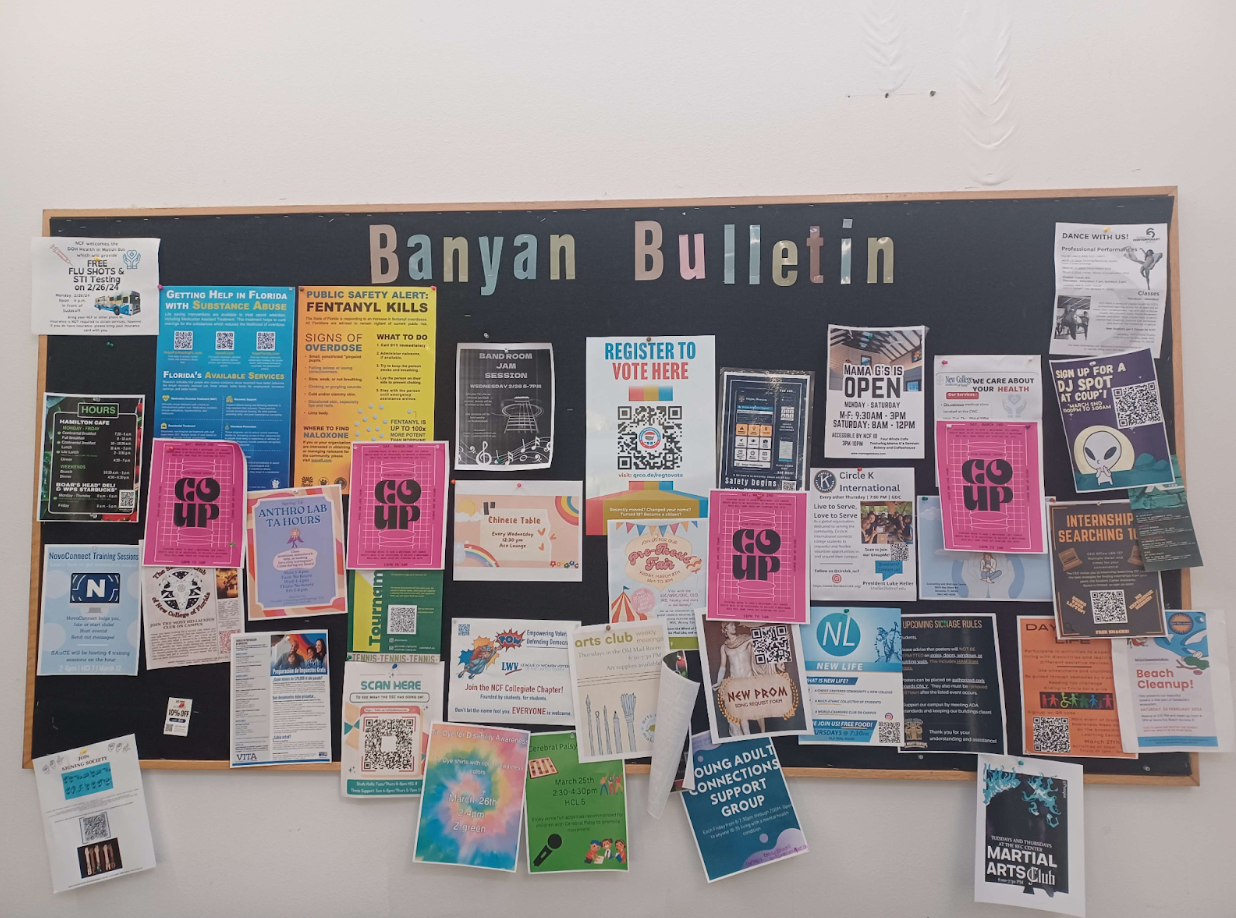New College of Florida’s policies on student communication have undergone many restrictive changes in the past year. This includes the deletion of the opt-in student forum and revoked access to the official Students List. No more stickers on doors, flyers restricted to bulletin boards, no chalking on the overpass. With little student input, these decisions have changed the way students, staff and faculty communicate with each other and disseminate information across campus.
The Forum
Introduced to the student body in the 1990s, the forum began as a simple bulletin board in Hamilton “Ham” Center where students posted notes and information via note cards, artwork and flyers. Only in the 2000s did it become digitized, evolving into an opt-in email list for peer-to-peer communication on campus. The forum has since served as a major venue for all forms of student inquiry and connection—until recently. It hosted practical requests for lost keys, information on campus events and sharing baking utensils, but wasn’t limited to such messages. Rather, the forum was an open platform for students to express their grievances, offer support in times of need and have conversations about the world beyond the academic sphere. Often, posts to the forum consisted of jokes.
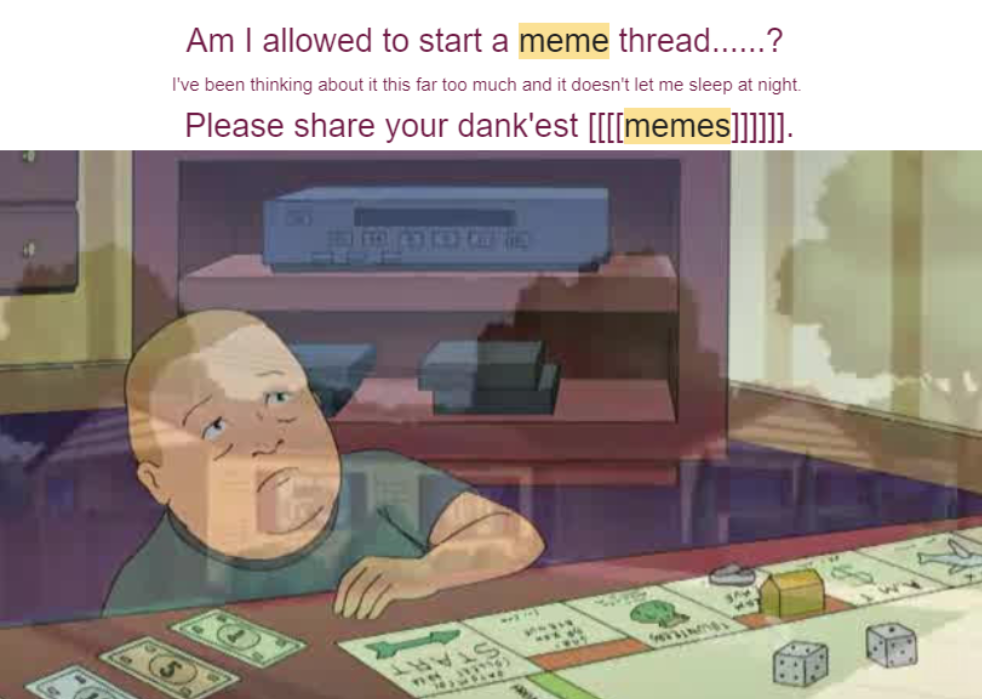
The Catalyst reached out to alums and current students about the forum’s role in New College life. “[The forum] was a great facet of our school for a few reasons,” Alex Caruso (’23), a forum moderator from 2017 to 2019, stated in an email interview. “The first is that it’s just an incredibly useful tool for easing access to goods and services for the student body.”
“Functionally, the forum served as a wonderful community resource,” Jessica Edmonds (’22) commented. “Don’t know a certain professor’s office hours? Post on the forum and you’ll get an answer within the hour. Leftover food from an event? Post on the forum and feed some hungry bellies while combating food waste. Found a stray airpod at the bayfront? Post on the forum and reunite it with its owner. Need an egg, a ride to the store, someone to study with in the library, advice, a place to emotionally vent? Post on the forum.
“The forum was also a place for students and alumni to connect,” Edmonds continued. “During my time at New College, many alumni would post about job opportunities through their current organizations, graduate programs, internships, affordable off-campus housing, et cetera.”
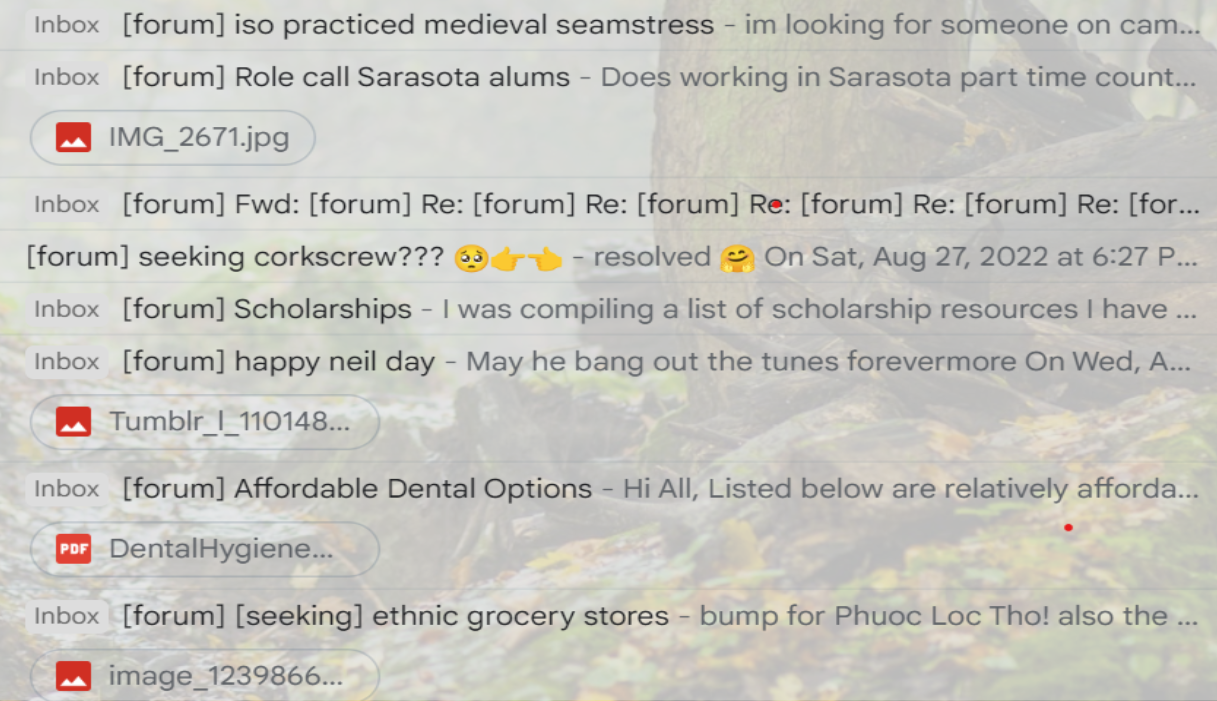
“The second reason why I think the forum was incredibly useful is that it provided a relatively low-stakes trial by fire in the realm of public discourse,” Caruso observed. “I think that for many it was a unique opportunity to really hash it out with your peers in a way that was both intimate and distant, so that real thoughts could be expressed in both productive and unproductive ways without any real spillover into campus life.”
Forum posts would be met by students with varying degrees of appreciation and frustration, a core component of what made the forum unique. Students had the choice to engage with and contribute their voices to these conversations at their own discretion. Moderation by a student official through the New College Student Alliance (NCSA) allowed for further transparency and student involvement with decisions made about the forum.
When New College’s Board of Trustees (BOT) saw an addition of six Gov. Ron Desantis appointees early in 2023, students were immediately concerned about whether the forum could exist as it had before. While it served as a way for students to come together and share information during a time of campus-wide instability, it may have acted as a double-edged sword. All emails under the NCF domain are available for public access through Florida’s Sunshine State Statute. Some of these student’s posts, often vents, were leaked onto X, previously known as Twitter, where the posts were subject to public scrutiny.
The sudden blast of negative exposure confirmed students’ fears. Left in a tentative limbo as students transferred or graduated and an influx of new students arrived, activity on the forum took a hit and dwindled before a final post was made on Dec. 22. The bill from the host server has not been paid and the forum is offline as of 2024.
“We know the last email was sent on Dec. 22, and I remembered during the first forum Committee meeting on Jan. 13, I checked the website status on Hostineer and it had listed that the website bill hadn’t been paid,” third-year and Catalyst staff writer Andy Trinh stated. “If you check Hostineer now it doesn’t show up at all. I sent a test email on Feb. 10 and it never went through, which is when I realized that it was probably down for good. I assume it’s been totally deleted now, but we’d probably have to reach out to Hostineer to see.”
The decision to keep the forum offline blindsided students, none more so than the New College Student Alliance (NCSA) Forum Committee. The Forum Committee was formed last fall to explore solutions to improve and maintain campus communication infrastructure.
“Communication is a crucial issue,” NCSA President Grace Keenan commented at the Feb. 13, 2024 Senate Meeting. “It’s incredibly important that the students are able to communicate with each other so we are taking this issue very seriously.”
Despite the efforts to establish transparent committees, conversations with administration are still ongoing and some students feel as though administration has not been open about the decision-making process. The New College Foundation, which has previously funded the forum, did not give any notice to the NCSA before the bill went unpaid. The domain name is no longer unclaimed by New College.
The forum had long been controversial among students and administration alike, but those controversies are symptomatic of a small campus that has long struggled with effective communication. The forum has always been part of an ongoing dialogue about what communication should look like for New College—a non-traditional campus that allows for free, interdisciplinary thought.
“The lack of even having the option to join the forum only serves to alienate the student body from itself in a way that is completely unhelpful,” Caruso stated.
Students List
If students must go without a forum, they’ll find their alternatives have also been restricted.
The Students List is the college’s official email list. Students, faculty and administrators were all previously able to use this list to post events, newsletters and club activities. The Students List has had its own fair share of criticism, the main contention being th at either students or faculty sent too many of their own emails and made inboxes difficult to sift through.
As of last year, students, clubs and most organizations have been restricted from access to the Students List altogether. This has left them with limited avenues to share information such as what student-led activities are being held, where they meet and when. Concerned staff have tried to shift to community-access calendar applications such as NovoConnect or Corq, though these have also caused confusion among students. In an email to the student community, Coordinator of Student Activities & Campus Engagement (SAuCE) Gabriela Ott (’22) explained that she now hosts NovoConnect training sessions “after hearing concerns not enough students know how to use [it].” Her announcement included this information: Four sessions will be held on Mar. 12 from 2-6pm in HCL 7. Each training will begin on the hour and only lasts one hour. All sessions will be the same and will offer a rundown of using NovoConnect for clubs, events and general involvement. This will be open to students, staff and faculty.
With little clarification from administration about these decisions and their fallout, students are left to pick up the slack and wait in limbo while the NCSA continues collaborative efforts in hopes of a solution.
“I am concerned about recent changes in the communication protocols which have occurred without prior notice, discussion or consideration for our community members,” Senate President Alexander “Fish” Sauer told the Catalyst. “Several colleagues have approached me expressing difficulties in accessing timely information, navigating unclear guidelines and disseminating updates regarding events or meetings after regular office hours.”
Physical communication restrictions
Campus communication via email is among the most direct and effective ways to grab the attention of the community. It may follow that students could make up for lack of electronic access during this period by a return to hand-inked and print media, though it is more effort for a shorter reach. Also, policy changes with regard to stickers, chalking and flyers on campus mean students must weigh the deepening discrepancy between reward and risk.
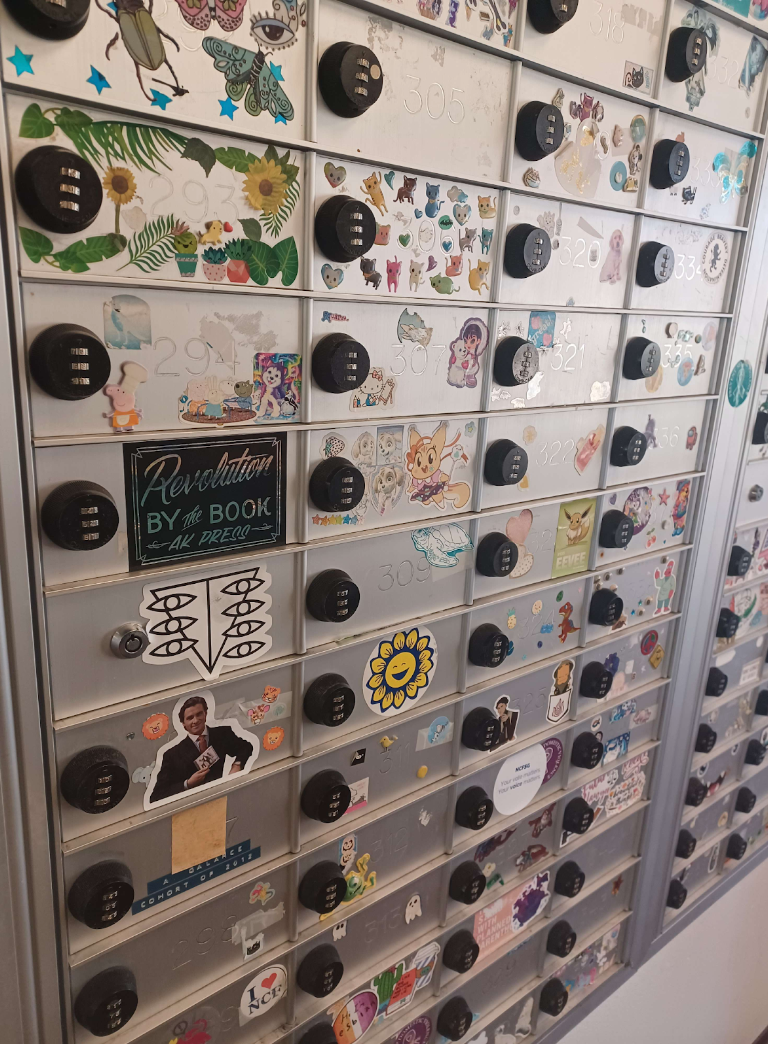
Stickering has long been a part of New College student culture, whether in the form of protest slogans or holographic Lisa Frank unicorns. They used to be plastered in student spaces like Ham, where it was tradition for students to personalize their mailboxes with stickers. Generations could look back to admire and laugh at the decades of contributions and add their own piece of history. However, it appears that stickering on campus may be more discouraged now than in the past.
“I have always enjoyed the tradition of decorating my office door with informative images and stickers. They often brought a smile and put visitors at ease,” Professor of Anthropology and Catalyst faculty sponsor Maria Vesperi stated. “When I returned from the winter holiday break I was surprised to find that everything had been removed. Had I been asked to do it I would have complied, but I was not contacted in advance.
“I do want to thank the person who was tasked with this because the stickers were carefully peeled and reapplied to the side of a metal file cabinet outside my door, making it possible for me to transfer them undamaged to the side of my own file cabinet. Looking at them again, I was puzzled because they are not partisan or provocative, just reminders of human rights, animal welfare and the natural world. My favorite comes from the American Civil Liberties Union (ACLU): ‘Because freedom can’t protect itself.’ I stay mindful of that as best I can.”
Chalking is a fun way for students to express themselves and make campus merry, but it is most often used to get the word out about student events as people walk to class. The policy has been to only use chalk where the rain can wash it away, otherwise maintenance has to clean it off. But much like with stickers, the policy has now become stringent. It took the administration less than a year to phase it out of existence, likely prompted by controversy involving students using it as an outlet to express discomfort with administrative changes. Chalk has been restricted to events approved by the Campus Police Department (CPD) and confined to the overpass. Now it is rare to see events advertised with chalk and chalk art is almost nonexistent.
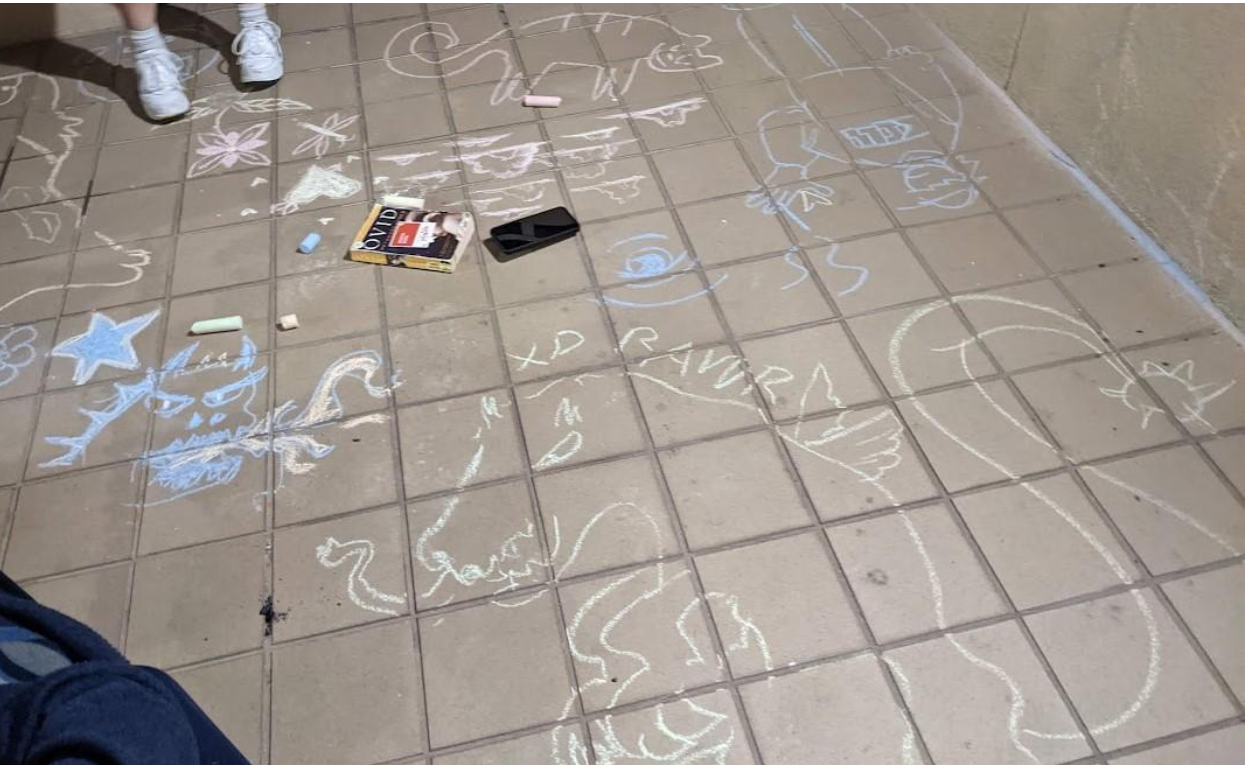
While stickers and chalk have languished, flyers have been subject to recent restrictions too. Papers, whether artistic or informational, can only be posted on bulletin boards, not hung from walls and doors where they are most visible to the pedestrian traffic. The recent removal of two bulletin boards by the overpass furthers the impact of such restrictions.
“I was not informed that the bulletin boards at the base and on the top of the overpass were getting removed,” Ott commented. “One of my students went to post a flier and saw they were gone. I have been told that outdoor bulletin boards were being removed because of the rain damage/dirt. Even the bulletins with casings were a bit old and the cork had bubbled.”
Ott informed the Catalyst about SAuCE’s efforts to address these concerns. “I have purchased a few new cork boards for Ham, offices, and Four Winds. Tim in the Black Box Theater (BBT) also generously donated one of his boards for student posters! We have asked students, club leaders, and other offices to tell us where they feel an indoor cork/bulletin board may be needed.
For ease of reference, here is a quick list of cork boards where students can post: SAuCE bulletin board, Rec Center, Ham lounge, Ham cafeteria exits, ACE tower, Heiser and the Four Winds Cafe.
When viewed apart, such changes may seem insignificant. But when considered together they curtail students’ ability to communicate in an effective manner.
In comparison, “There’s usually fliers everywhere on campus, like even in the bathroom stalls,” Florida State University (FSU) fourth-year Kate Lewis told the Catalyst. “You can put posters pretty much anywhere you want and there’s a lot of boards along the sidewalks designed for posters and fliers… I see chalk art and announcements all the time.”
New College isn’t just any campus. Enrollment averages well under 1,000 each year and the majority live on or near the school, an intentional part of the college’s liberal arts curriculum model. According to U.S. News & World Report,liberal arts colleges differ from traditional academic systems in that they focus on “smaller class sizes, wide-ranging curricula and tight-knit communities to develop students into free thinkers who are versatile in the professional workforce.”
In consideration of such differences, the approach to campus communication should be equally unique and allow for student involvement when it is a crucial part of their experience at NCF.
“Campus spaces, especially the residential side which receives no exemptions from the new policies, should reflect students’ wants and needs,” second-year and Catalyst staff writer Riley Bucklin stated. “Student voices are being overlooked by administrators who do not have to live in these spaces for the next few years of their lives.”
Campus reactions
In a college where the vast majority of students live on or very close to campus, communication is unique and has special importance because of New College’s small size and historic lack of adequate funding. A lack of resources in turn fosters a community where it is not only encouraged but necessary to engage with peers for support and enrichment.
“I guess to summarize my feelings about it is you could spend all day being mad at what’s going on on the forum, or you could take a lesson from it and learn how to interface with groups of people who don’t have to agree with you and mediate your own feelings about it in a way that allows you to more confidently participate in public discourse,” Caruso stated. “I think it’s hilarious that a group of conservative[s] who are always espousing the value of the ‘free marketplace of ideas’ shut down a literal marketplace of ideas at the school they took over.”
“[Student communication] is definitely much worse. With the lack of the forum, or posters, or literally anything else replacing it, it’s not great,” Trinh shared.
First-year students have also been impacted by the communication decisions that have taken place on campus since last year, creating a drastically different community experience at New College for them than for students in the past. Many first years rely on Novoconnect occasionally, but mainly receive information through other students and through Instagram.
“Communications at NCF seem disorganized,” first-year Alex Jahid commented. “I would say some information is accessible but even if you actively search, certain information cannot be found… I’d say the most inaccessible formal information is that about tutorials and on-campus resources. As for informal information, definitely information regarding NCF lore, cool spots on campus and ways to get involved, this type of information can be obtained but it requires getting to know older students, which many first years do not do.
“My peers and I absolutely have an interest in forum-style communication. We were bummed to hear of it being removed,” they concluded.
Residential life is inseparable from the academic and administrative facilities across Tamiami Trail. If decision-making on policies that affect campus life were effectively communicated, students could be more prepared to approach them in a meaningful way. Without definitive answers to why these changes were made or potential alternatives, it becomes difficult to find workable solutions.
“Despite the inherent complexities of managing a small campus with limited resources and competing priorities, I am puzzled by the sudden unavailability of the forum platform,” Sauer stated. “It is my understanding that the forum served as an opt-in space, and its discontinuation appears incongruent with the administration’s stated objectives, particularly in transitioning away from the Students List. Moving forward, I urge for transparent dialogue and collaborative efforts to address our communication needs effectively and inclusively.”

